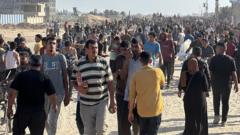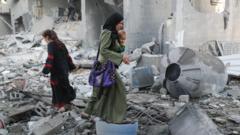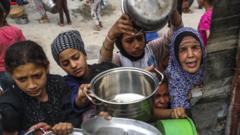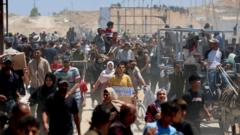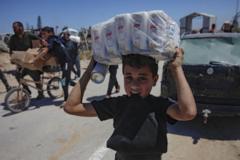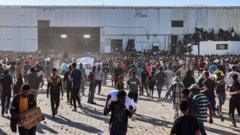The evacuation of al-Awda hospital has heightened the humanitarian crisis in North Gaza, where no operational hospitals remain after intense military pressure. Health officials express deep concerns over the health implications for the area's residents.
Evacuation of Last Hospital in Northern Gaza Sparks Urgent Health Crisis
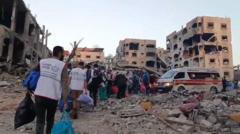
Evacuation of Last Hospital in Northern Gaza Sparks Urgent Health Crisis
Al-Awda hospital in Jabalia, the final functioning health facility in North Gaza, has been evacuated following Israeli military orders, leaving patients without access to critical medical care.
In a significant escalation in the ongoing conflict, the al-Awda hospital in Jabalia, the last health facility operational in the North Gaza governorate, has been fully evacuated following orders from the Israeli military. Dr. Mohammed Salha, director of the hospital, expressed deep distress over the evacuation, which he said was necessitated by threats from Israeli forces to bomb the facility if it remained open. The evacuation occurred late Thursday evening, after lengthy negotiations during which Dr. Salha initially resisted due to the critical needs of patients.
The conditions surrounding the evacuation have drawn attention to the severe humanitarian crisis unfolding in the region. The World Health Organization (WHO) has reported that there is now no functional hospital in North Gaza, effectively cutting off health services for the area's population. Dr. Salha informed the media that the staff managed to transfer patients to al-Shifa hospital in Gaza City but faced immense challenges due to the destruction of roads following two weeks of military actions.
The Israeli Defense Forces (IDF) have justified their operations by claiming to target terrorist groups using hospitals as shields, stating that areas around Jabalia are now classified as dangerous combat zones. However, humanitarian organizations have reported that the hospital had been attacked multiple times prior to the evacuation, resulting in injury to staff and the loss of medical supplies.
Despite the closure of al-Awda, some primary healthcare centers remain functional in Gaza, though their capacity and reach are severely limited. Aid delivery efforts are ongoing, but international humanitarian organizations, including the UN, demand increased access and protection for civilian facilities amidst escalating conflict.
The recent military operations have intensified concerns amongst humanitarian agencies, with UN officials warning of a critical risk of famine affecting Gaza's 2.1 million residents. Ongoing concerns over Israel's blockade and military actions continue to fuel international debates regarding humanitarian assistance and the safety of civilians in conflict zones.
Global leaders, including French President Emmanuel Macron, have urged Israel to increase humanitarian aid access or face intensified diplomatic scrutiny. In contrast, internal protests reflect a complex dynamic in Israel, with some factions opposing aid deliveries unless security concerns regarding hostages held by Hamas are addressed. The overall situation presents a troubling paradox as civilians caught in the conflict experience increasingly dire circumstances, with calls for an immediate cessation of hostilities echoing in both local and international arenas.
The conditions surrounding the evacuation have drawn attention to the severe humanitarian crisis unfolding in the region. The World Health Organization (WHO) has reported that there is now no functional hospital in North Gaza, effectively cutting off health services for the area's population. Dr. Salha informed the media that the staff managed to transfer patients to al-Shifa hospital in Gaza City but faced immense challenges due to the destruction of roads following two weeks of military actions.
The Israeli Defense Forces (IDF) have justified their operations by claiming to target terrorist groups using hospitals as shields, stating that areas around Jabalia are now classified as dangerous combat zones. However, humanitarian organizations have reported that the hospital had been attacked multiple times prior to the evacuation, resulting in injury to staff and the loss of medical supplies.
Despite the closure of al-Awda, some primary healthcare centers remain functional in Gaza, though their capacity and reach are severely limited. Aid delivery efforts are ongoing, but international humanitarian organizations, including the UN, demand increased access and protection for civilian facilities amidst escalating conflict.
The recent military operations have intensified concerns amongst humanitarian agencies, with UN officials warning of a critical risk of famine affecting Gaza's 2.1 million residents. Ongoing concerns over Israel's blockade and military actions continue to fuel international debates regarding humanitarian assistance and the safety of civilians in conflict zones.
Global leaders, including French President Emmanuel Macron, have urged Israel to increase humanitarian aid access or face intensified diplomatic scrutiny. In contrast, internal protests reflect a complex dynamic in Israel, with some factions opposing aid deliveries unless security concerns regarding hostages held by Hamas are addressed. The overall situation presents a troubling paradox as civilians caught in the conflict experience increasingly dire circumstances, with calls for an immediate cessation of hostilities echoing in both local and international arenas.

